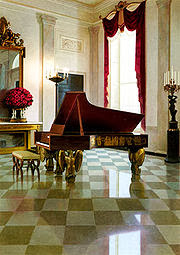In Review--The Spirit of India
Gundecha Brothers and Pushparaj Koshti
Temple Voices
Sense World Music
Pushparaj Koshti
Surbahar
Sense World Music
The ancient vocal form Dhrupad seemed to be in slow terminal decline according to the liner notes for The Gundecha Brothers' latest recording, Temple Voices. Also in the liner notes, "The Gundecha Brothers are at the forefront of the revival in fortune that has overtaken the ancient vocal form, Dhrupad." It had fallen victim to the popularity of the Khayal tradition. Also from my understanding of it, Dhrupad had also suffered the reputation of being painfully slow, and one writer for The Rough Guide to World Music, Volume 2 had compared Dhrupad to watching paint dry.
I actually appreciate this ancient Indian vocal style. Yes, it unfolds slowly, but for those with patience (which is not many these days), this gentle unfolding does pay off. The vocal fireworks that contributed to the popularity of the Khayal form are not present in the same regard. Dhrupad is more subtle, and its journey more contemplative. Its liken to the journey where one stops to smell the roses, drink in sunlight and retreat a little from the chaos of living. And I even would go as far as to recommend listening to Dhrupad to increase one's attention span and patience. I have found it helpful in that regard.
If you listen closely to the Gundecha Brothers sing on Temple Voices, you will hear a rich polyphony of two voices, with some vocal overtones, especially when the brothers sing in baritone voices. You will also hear masterful performances that reward its listeners. (For more information about their education, garana and biographical details of these vocalist, please visit www.senseworldmusic.com)
The liner notes describe a Dhrupad performance as, "hugely concentrated expressive force but largely unadorned except for connecting slides and pitch-bending, rather buried beneath layers of ornament and frisky invention as you might hear in another Alap...Compared to many performers who like to show off their prowess as early as they can, a dhrupad singer will make you wait; but the payoff is all the more thrilling for the length of build-up."
Surbahar (akin to a bass sitar) player Pushparaj Koshti performs on the Gundecha Brothers' Temple Voices and performs solo on his recording, Surbahar. He performs instrumental Dhrupad--starting out on the lowest end of his instrument and eventually stretching out to higher notes. I will admit that it would be easier for newcomers to this form of classical Indian music to begin with vocal Dhrupad and work their way towards the instrumental form.
However, this rare Surbahar performance accompanied by the double-ended pakhawaj drum played by Manik Munde, has its spellbinding moments as well. The liner notes mention, "A degree of patience is required of a listener, or at least a will to let the big picture build over time. For followers of Western classical music the natural comparison would be with a symphony by Anton Bruckner, as opposed to a piano piece by Franz Liszt."
I might also add that a Dhrupad listening experience compares to a slow blooming flower that does not dazzle our senses right away, but chooses the right moment, when we have found a stillness of mind.
senseworldmusic
I would like to thank Robert Maycock for his informative liner notes. Certainly these notes assisted me in enjoying these two recordings.
Temple Voices
Sense World Music
Pushparaj Koshti
Surbahar
Sense World Music
The ancient vocal form Dhrupad seemed to be in slow terminal decline according to the liner notes for The Gundecha Brothers' latest recording, Temple Voices. Also in the liner notes, "The Gundecha Brothers are at the forefront of the revival in fortune that has overtaken the ancient vocal form, Dhrupad." It had fallen victim to the popularity of the Khayal tradition. Also from my understanding of it, Dhrupad had also suffered the reputation of being painfully slow, and one writer for The Rough Guide to World Music, Volume 2 had compared Dhrupad to watching paint dry.
I actually appreciate this ancient Indian vocal style. Yes, it unfolds slowly, but for those with patience (which is not many these days), this gentle unfolding does pay off. The vocal fireworks that contributed to the popularity of the Khayal form are not present in the same regard. Dhrupad is more subtle, and its journey more contemplative. Its liken to the journey where one stops to smell the roses, drink in sunlight and retreat a little from the chaos of living. And I even would go as far as to recommend listening to Dhrupad to increase one's attention span and patience. I have found it helpful in that regard.
If you listen closely to the Gundecha Brothers sing on Temple Voices, you will hear a rich polyphony of two voices, with some vocal overtones, especially when the brothers sing in baritone voices. You will also hear masterful performances that reward its listeners. (For more information about their education, garana and biographical details of these vocalist, please visit www.senseworldmusic.com)
The liner notes describe a Dhrupad performance as, "hugely concentrated expressive force but largely unadorned except for connecting slides and pitch-bending, rather buried beneath layers of ornament and frisky invention as you might hear in another Alap...Compared to many performers who like to show off their prowess as early as they can, a dhrupad singer will make you wait; but the payoff is all the more thrilling for the length of build-up."
Surbahar (akin to a bass sitar) player Pushparaj Koshti performs on the Gundecha Brothers' Temple Voices and performs solo on his recording, Surbahar. He performs instrumental Dhrupad--starting out on the lowest end of his instrument and eventually stretching out to higher notes. I will admit that it would be easier for newcomers to this form of classical Indian music to begin with vocal Dhrupad and work their way towards the instrumental form.
However, this rare Surbahar performance accompanied by the double-ended pakhawaj drum played by Manik Munde, has its spellbinding moments as well. The liner notes mention, "A degree of patience is required of a listener, or at least a will to let the big picture build over time. For followers of Western classical music the natural comparison would be with a symphony by Anton Bruckner, as opposed to a piano piece by Franz Liszt."
I might also add that a Dhrupad listening experience compares to a slow blooming flower that does not dazzle our senses right away, but chooses the right moment, when we have found a stillness of mind.
senseworldmusic
I would like to thank Robert Maycock for his informative liner notes. Certainly these notes assisted me in enjoying these two recordings.



Comments
Post a Comment